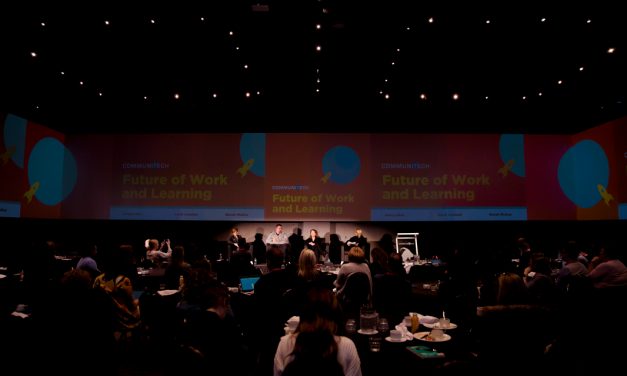Flexibility. An open mind. Listening to your employees. Making them feel needed. Helping people develop and learn throughout their careers. And leveraging and enhancing Waterloo Region’s inherent strengths.
That’s how companies weather the coming revolution of workplace change brought on by technology, a Tannery Event Centre audience heard Tuesday morning at a breakfast event titled the Future of Work and Learning – Generating a Community Conversation.
The event, the second of a series on the future of work and learning that will culminate at Communitech’s True North conference on June 19-20, grappled with weighty issues that vex planners, politicians, and industry leaders as the pace of innovation accelerates and jobs are threatened by algorithms and smart machines.
“What are the other capabilities or talents our graduates are going to need to be able to be adaptively resilient and be able to move in directions that we can’t even predict?” asked Norah McRae, Associate Provost, Co-operative and Experiential Education at the University of Waterloo, one of three roundtable members of the hour-long discussion, moderated by Christine Robinson, Head of Human Resources at Manulife Canada.
“Yes, curriculum is important. But there are these other dimensions that we need to equip our students and graduates for so they can flourish in this very unpredictable world into which they’re graduating.”
Other panelists included Carol Leaman, CEO of Waterloo-based scale-up Axonify, and Greg Loker, Vice-President, Product Line Engineering at Manulife.
Robinson opened the conversation by asking panelists about this region’s existing advantages. Responses included low real estate prices, strong post-secondary academic institutions – particularly University of Waterloo’s co-op based programs – and Waterloo Region’s spirit of co-operation, its can-do ethos. All were attributes, the panelists said, that will stand this area in good stead as change unfolds.
“I travel a ton. I see what goes on in other places,” said Leaman. “You do start to realize quickly we have a unique combination in this community of fantastic education institutions – Waterloo, Laurier, Conestoga College – we have support systems in the likes of Communitech, the Accelerator Centre, Velocity, things that provide support for innovation.
“[And] as Greg mentioned, there’s something about the connectedness of this community, where I know if I have a question I can pick up the phone or email somebody to say, ‘What do you think about this?’, or, ‘How do you deal with that?’”
Threats to the future of work are impossible to clearly define, said Loker. Companies must prepare for them by putting employees in a position to respond quickly to change. And that means establishing a culture of education and skill development.
“The reality is those jobs aren’t even defined yet,” he said. “The answer varies company to company. They may be highly customized.
“The only way to respond is to ensure that you are constantly obsessed with developing your employees – setting plans in place that are best for them. Make that part of a regular, two-way dialogue.”
McRae said it was vital for companies to attract diverse people with a wide range of talent who are open to “ideas from all over the world,” as a hedge against change.
“Having the broadest world view possible not only reinvigorate your own thinking but also brings an infusion of new idea.” she said. “A big risk any organization faces is we become too inward looking. Always being exposed to external ideas and different ways of seeing problems is healthy.”
A third event in the future of work series will take place in April in the form of focused, peer-to-peer workshop conversations. The date has yet to be finalized.
Tuesday’s event was sponsored by Manulife, Deloitte, the University of Waterloo, Axonify and the Province of Ontario.


